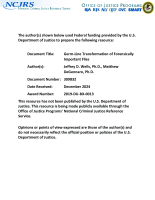Researchers
Advancing Police-researcher Collaboration and Evidence-based Policing: an Evaluation of the Applied Criminology and Data Management Course
Understanding the Needs of and Resources for Victims of Criminal Justice System-Related Harm
Three Perspectives on Performance Measurement - Funders, Practitioners, and Researchers
Sex Estimation Using Sexually Dimorphic Amelogenin Protein Fragments in Human Enamel
Germ-Line Transformation of Forensically Important Flies
Positive Identification Using Frontal Sinus Comparisons: Developing Empirically Based Guidelines
Analyzing and interpreting deoxyribonucleic acid from multiple donors using a forensically relevant single-cell strategy
Taku Eyachantognaka Owihankeya Wanica, Community Brief
Taku Eyachantognaka Owihankeya Wanica, Tribal-Researcher Partnership Lessons Learned
Enhancing Genetic and Epigenetic Sample Preparation with Microfluidics
Celebrating 10 Years of NIJ’s Law Enforcement Advancing Data and Science (LEADS) Scholars Program - 2024 NIJ Research Conference
In 2014, NIJ established the Law Enforcement Advancing Data and Science (LEADS) Scholars Program to support research-minded, mid-career sworn law enforcement officers working to integrate research into agency policy and practice. The LEADS Scholars Program helps participants develop independent research and provides support to identify current evidence on priority issues.
See the YouTube Terms of Service and Google Privacy Policy
Understanding the Impact of COVID-19 on Victim Services
The COVID-19 pandemic had a detrimental impact on communities across the nation and significantly affected various aspects of individuals’ lives. One of the negative impacts was an increase in gender-based violence accompanied by shifting barriers to accessing services and support. Victims and victim service providers faced various challenges dealing with the increase in need for services, navigating barriers to help-seeking, and addressing logistical issues.
See the YouTube Terms of Service and Google Privacy Policy
The Relevance of Marriage Plans for Cohabiting Emerging Adults' Psychological Well-Being: Considering Economic Security and Relationship Quality
mtDNA-based Identification of Lucilia Cuprina (Wiedemann) and Lucilia Sericata (Meigen) (Diptera: Calliphoridae) in the Continental United States
What's Known and Unknown about Marijuana, Part 2
Marijuana legalization poses many challenges — especially those related to drug chemistry and toxicology — for researchers, law enforcement, and policy makers. In the latest episode of Justice Today, NIJ Communications Assistant Josh Mondoro hosts a conversation with NIJ Scientist Frances Scott about marijuana toxicology, including comparing its effects to alcohol, measuring impairment, and maintaining public safety as more and more states legalize recreational marijuana.
The Impact of Drugs on Human Decomposition: What Insect, Scavenger, and Microbial Evidence Tells Us
What's Known and Unknown about Marijuana, Part 1
Marijuana poses many challenges for researchers, law enforcement, and policy makers, challenges that fall into two fields: drug chemistry and toxicology. NIJ scientist Dr. Frances Scott joins this episode to explain the complications in drug chemistry and how difficulties defining marijuana lead to backlogs in crime labs around the country. NIJ Communications Assistant Josh Mondoro hosts.






